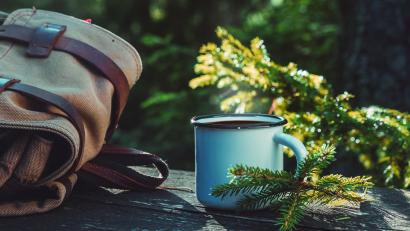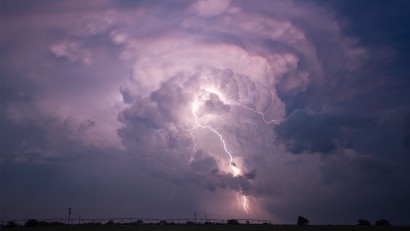- 1. Key Takeaways
- 2. Camping Food Storage – Things to Consider
- 2.1. Why is It Important?
- 2.2. How Long Will You Be Gone?
- 2.3. How Many People Are in Your Camp Group?
- 3. Cooking Gear and Equipment to Bring
- 3.1. Campsite Cooking Checklist
- 3.2. What if I Don’t Bring Cooking Equipment?
- 4. How to Keep Your Food Fresh While Camping
- 4.1. Bring a Cooler
- 4.2. Use Ice Packs and Freeze Meat
- 4.3. Keep Your Food in the Shade
- 4.4. Pack Non-Perishables and Fresh Fruits and Veggies
- 5. How to Store Food While Camping
- 5.1. Camping Food Storage At a Campsite
- 5.2. Camping Food Storage While Dispersed Camping
- 6. KÜHL’s Tips on How to Handle and Store Food When Camping
- 7. Final Thoughts
- 8. FAQs
- 8.1. Should I keep food in my tent?
- 8.2. How long does camping food last?
- 8.3. What's the best food to take camping?
- 8.4. How do you protect eggs while camping?
- 8.5. How long does dehydrated food last if vacuum sealed?
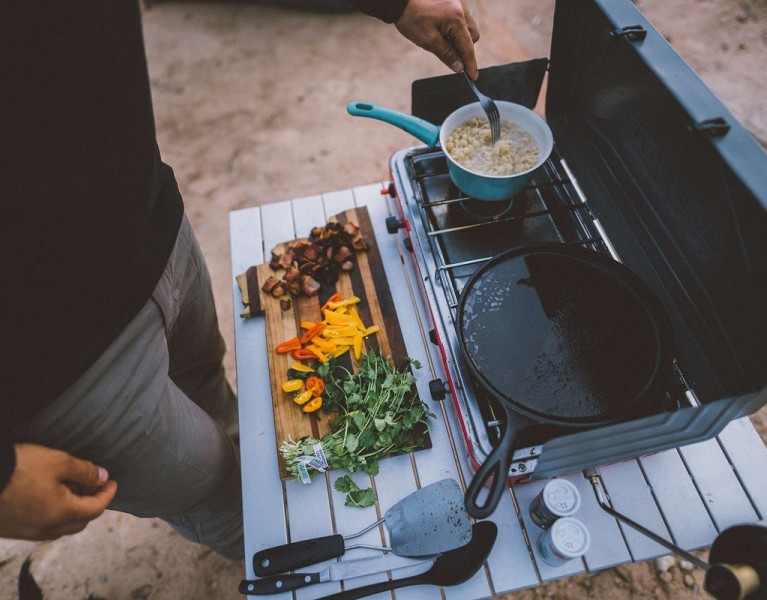
The Complete Camping Food Guide: Prep, Storage, and More
Table of Contents [Show]
Mastering the art of camping food storage is a cornerstone of any outdoor adventure. In this guide, we’ll explore practical and effective ways to keep your food fresh and secure – delving into smart choices for containers and resourceful tips for keeping things cool. We’ll also provide essential strategies for wildlife-proofing your supplies. This guide is designed to be a comprehensive resource for campers looking to enhance their outdoor experiences with efficient food storage techniques. Let’s take a deeper look into maintaining your provisions in the wild!
Key Takeaways
- Understanding the importance of efficient camping food containers.
- Essentials for packing and storing food for camping safely.
- Tips for maintaining food quality during your camping trip.
- Strategies to prevent wildlife encounters, particularly in bear-prone areas, and adopting sustainable practices.
Camping Food Storage – Things to Consider
When planning your outdoor meals for camping, it's essential to consider the duration of your trip, the size of your group, any dietary restrictions, and the type of camping - be it car camping or dispersed camping.
Efficient food storage is key in keeping your provisions safe and minimizing your campsite's environmental impact. Implementing practical camping food and kitchen storage hacks and ideas can greatly enhance your camping experience, ensuring that your food stays fresh and your campsite remains organized.
Let’s look at things to consider when it comes to food storage for camping.
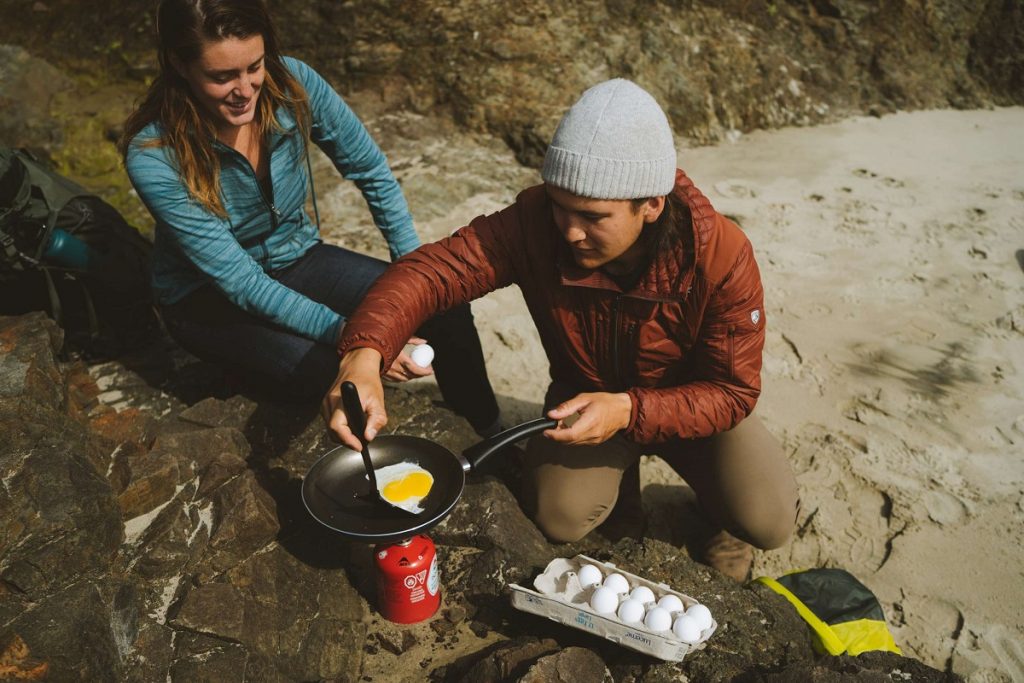
Why is It Important?
By learning how to pack food for camping effectively, you significantly reduce the risk of food spoilage or contamination. Proper food storage while camping is key for a few big reasons:
- It keeps your meals safe to eat and tasting great.
- By picking the right ways to store your food, you reduce the chances of it getting spoiled or contaminated, ensuring you get all the nutrients you need.
- Being smart about how you store your food means less waste and being kinder to the environment when you're out in the wild.
When you understand why food storage matters, you make better choices about what food to take camping. You think more about safety, nutrition, and convenience. This means everyone on the trip enjoys better meals and a better time outdoors.
How Long Will You Be Gone?
The time you'll spend camping will determine how much food you'll need. Aim for three solid meals a day, and don't forget about snacks to keep your energy up. If your trip stretches over several days, planning some meals you can have more than once is smart. For backpackers, remember, the lighter, the better. And water? Bring loads of it – staying hydrated is key. For those who want to be extra prepared, make sure to check out our guide on delicious backpacking meals.
How Many People Are in Your Camp Group?
Catering to the needs of your entire group requires careful planning. The number of people influences the quantity and variety of food needed and the size of storage containers and coolers. Planning your camping meals should be pretty straightforward if it's just you and a buddy. You'll likely find it easy to agree on what to eat daily. But when more folks join in, things can get a bit trickier. Everyone's got their likes and dislikes, and sometimes dietary needs play a big role. You might even need to split up the cooking if people desire different things. And if there are kids in the mix, don't forget to pack some kid-friendly snacks and simple meals they'll love, like gummies, crackers and granola bars.
Does Anyone Have Diet Restrictions?
When planning your camping menu, checking with everyone about any dietary needs is a good idea. Maybe someone's lactose intolerant, vegetarian, or following a keto diet. You'll want to keep these in mind when you're deciding on meals. For any vegans in your group, check out this guide to vegan camping food to make planning easier.
Here's a tip: Veggie dishes usually last longer without spoiling, so they're an excellent choice for a hassle-free camping meal plan. But if you're really into meat, no worries – just make sure you've got a cooler to keep it fresh. And for an easy fix, don't forget about non-perishable options like beef jerky or canned chicken.
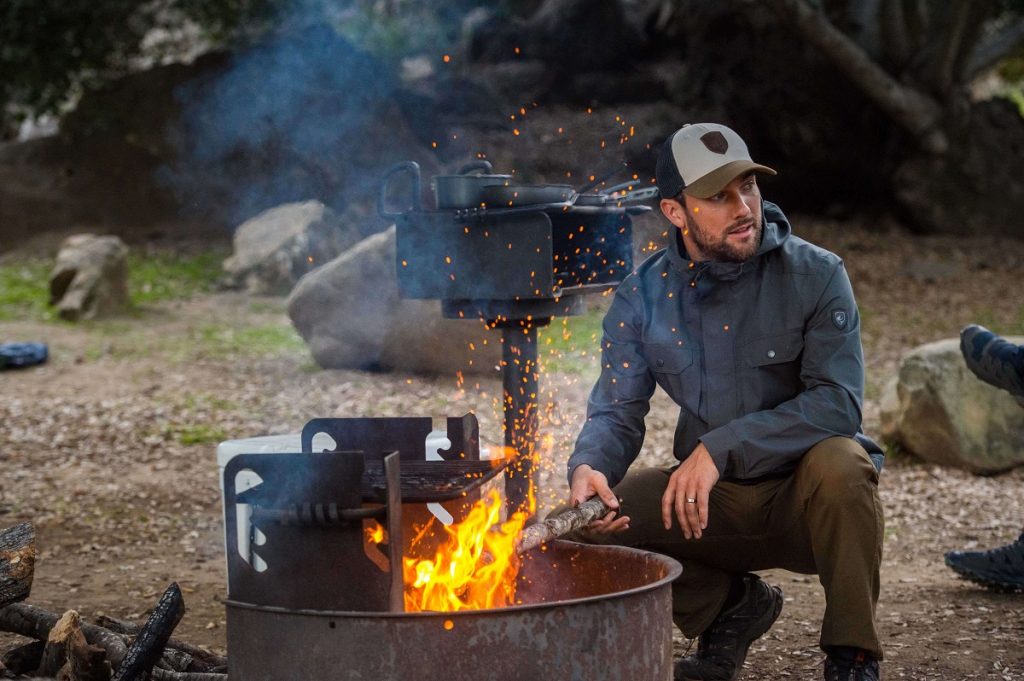
Cooking Gear and Equipment to Bring
Packing the right gear is essential for your outdoor culinary needs. This includes choosing appropriate containers and coolers to ensure your food stays fresh and safe from animals.
When you're gearing up for your camping trip, thinking about how you'll cook your meals is also key. If you've got a propane stove, you're all set for easy and controlled cooking – it's great for whipping up a quick meal. Cooking over a campfire is classic camping fun, perfect for roasting marshmallows or grilling hot dogs. And if your campsite has a grill, that's a bonus! You can grill just about anything for a tasty outdoor feast.
When planning your camping meals, it's important to think about the aftermath – specifically, trash and cleanup. Being in the great outdoors means we've got a responsibility to leave no trace. So, plan your meals with the idea of minimal waste. Think about how you'll dispose of trash and how you can keep things tidy. After cooking, cleaning up is crucial. Whether it's wiping down surfaces or washing dishes, make sure you have what you need to keep your campsite as clean as you found it. Remember, a clean campsite is not only respectful to nature but also to fellow campers.
Below is a simple checklist with items that will be helpful when preparing meals in the woods. For a more comprehensive look at what to bring while camping, check out this guide to the ultimate camping checklist.
Campsite Cooking Checklist
- Propane stove, if you’re going the modern route.
- Matches or a lighter for that campfire magic.
- A portable grill or grilling tools if you plan to use the campsite grill.
- Pots, pans, cutting board, and cooking utensils for your chef's moments.
- A cooler for keeping perishables fresh.
- Camping containers for food (try to avoid glass)
- Basic food supplies (think easy-to-cook and high-energy foods).
- Plenty of water and some water purification tools.
- Camping food bags for storage and trash.
- Plates or bowls
- Paper towels or washcloths
- Tin foil
- Seasonings
- Oil (try to avoid bringing glass containers)
What if I Don’t Bring Cooking Equipment?
Not into bringing cooking gear? That’s totally fine – you can still enjoy great meals while camping. Save yourself the hassle of cooking and cleaning by going for no-cook options. There are a bunch of tasty foods that don't need heat to be delicious.
Foods that Don’t Require Heat
- Cereal – just add milk or a milk alternative
- Sandwiches – get creative with the fillings
- Wraps – easy and versatile
- Premade pasta salad – a refreshing choice
- Hard-boiled eggs – great for protein
- Granola bars – for a quick snack
- Chips and salsa – a classic
- Veggies and hummus – healthy and satisfying
For those preferring minimalistic camping or lacking cooking gear, focus on non-perishable items like nuts, dried fruits, and energy bars. You can get some more inspiration from these delicious picnic food ideas.
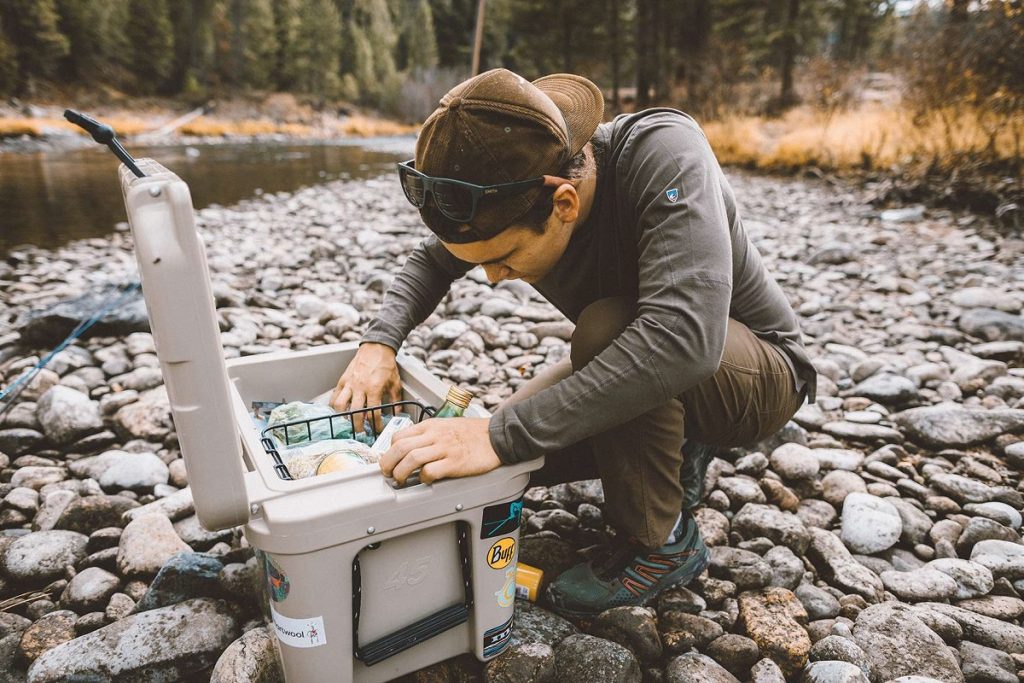
How to Keep Your Food Fresh While Camping
Keeping your food fresh when camping is super important, especially if you plan on bringing perishables (meat, dairy products, prepped food, etc.). You want your meals to be tasty and safe while out in the woods, so here are some tips to ensure their freshness.
Bring a Cooler
Use an insulated cooler for things like fruits, meats, and dairy to keep them cool and prevent them from going rancid. Pack your cooler wisely to keep things cold longer and avoid mixing different types of food. A cheap styrofoam cooler may work for an overnight camping trip, but you’ll need something more sturdy any longer than that. You can buy an affordable plastic cooler to keep your food cool for an extra day or so. Your best bet is a higher-end fiberglass or steel cooler if your budget allows. These coolers are designed to keep food cool for several days and often have features such as shelves and drainage plugs.
Use Ice Packs and Freeze Meat
Use ice packs or frozen water bottles to keep items cooler longer. Freezing your meat will also help reduce the temperature within the cooler, and keep your meat fresh for more days.
Keep Your Food in the Shade
Here's a simple trick: use natural shade to help keep things cool, especially when the cooler's packed to the brim. Place your cooler under a tree, away from direct sunlight. Do not leave your cooler in the car if it’s hot out, as cars can overheat in the sun. For added insulation, wrap your cooler with a blanket or towel.
Pack Non-Perishables and Fresh Fruits and Veggies
A good tip is to plan your meals so you use up perishable food first. This way, you get to enjoy the fresh stuff early on. Later in your trip, you can switch to foods that don't need to be kept cold, like canned goods or dried snacks. You should always bring some non-perishable items to be safe. Canned and boxed foods are a good option, as well as nuts and dried fruits. While they aren’t technically non-perishables, most fresh fruits and veggies will be good for at least a few days without refrigeration.
Foods that don’t need to be refrigerated:
- Canned goods (beans, vegetables, fruits)
- Dried fruits (raisins, apricots)
- Nuts and seeds (almonds, sunflower seeds)
- Jerky (beef, turkey, or plant-based)
- Hard cheeses (Parmesan, aged cheddar)
- Whole grain crackers
- Peanut or other nut butters
- Granola and energy bars
- Instant oatmeal packets
- Shelf-stable milk or milk alternatives
- Pre-cooked grains (quinoa, rice)
- Instant coffee or tea bags
- Dark chocolate
- Tortillas or flatbreads
- Dehydrated meals
- Trail mix
- Honey or jam (in squeeze bottles)
- Instant soup or noodle cups
- Pre-cooked, vacuum-sealed meats (like salami)
- Bread or bagels
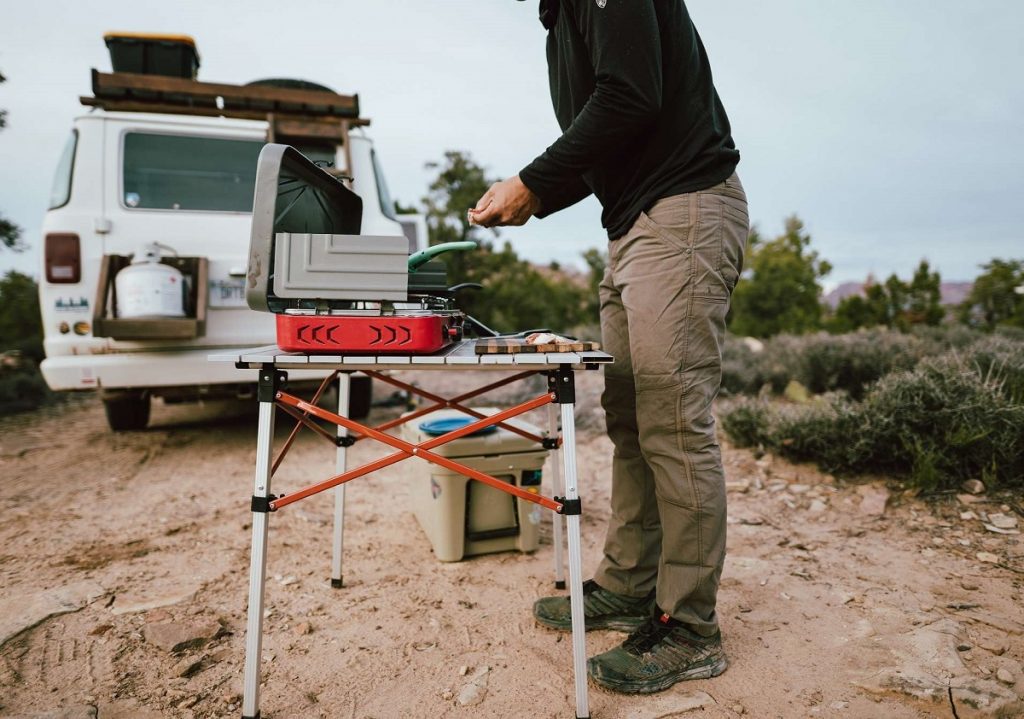
How to Store Food While Camping
Proper food storage for camping involves more than just keeping food fresh; it's about safety too. Store food away from your sleeping area to avoid attracting animals. Wherever you go, there will likely be some sort of animal that would love to dig into whatever food you brought. Mice and raccoons are a nuisance if they gnaw their way into your backpack full of groceries, but bears can pose an actual danger to you. Additionally, bears that become too comfortable coming close to humans often end up getting killed due to safety precautions. This is why it’s extremely important to properly store your food.
Camping Food Storage At a Campsite
When setting up at a campsite, take advantage of any designated food storage boxes provided. These are designed to keep your food secure and away from curious animals. If those aren't available, a sturdy cooler or your vehicle is your next best bet; it’s unlikely animals will be able to get into your car or even smell the food. Remember, keeping the area clean is just as important. Leftover crumbs or unsealed food can attract wildlife, so always clean up after meals. A good rule of thumb is leaving the site cleaner than you found, ensuring a safe environment for you and the local animals.
Designated Metal Food Lockers (or Bear Boxes)
If your campsite has one, leave your food in a metal bear-proof camping food box. Just make sure to properly close the latch.
Your Car
If there are no bear boxes and you have your car with you, your car is a great place to leave food. It’s unlikely animals will be able to get into your car or even smell the food.
Secured Cooler
If you have a higher-end cooler with latches, you may be able to use your cooler as a mode of storage. Do not use a cooler that can easily be pushed open, or a zippered cloth cooler.
Camping Food Storage While Dispersed Camping
When it comes to dispersed camping, which often places you far from the conveniences of established campsites, understanding how to store food when camping becomes even more critical. In these scenarios, hanging your food high in a tree, well away from your sleeping area, is crucial. Bear bags or canisters are essential here, as they're designed to withstand the elements and keep critters at bay. The goal is to protect your food from wildlife and also protect wildlife from becoming accustomed to human food. These are especially important steps when it comes to backpacking food storage.
Bear Canister
If you are backpacking through bear country, use a bear canister. These are plastic with screwable lids and come in different sizes. They usually weigh a few pounds, but you can be quite confident a bear won’t be able to twist it open.
Bear Bag
These are lighter than a bear canister. However, be aware that some backpacking areas do not allow these as a form of bear-proof food storage. Remember to hang these bags high and at a distance from your tent to ensure a peaceful and safe night's sleep.
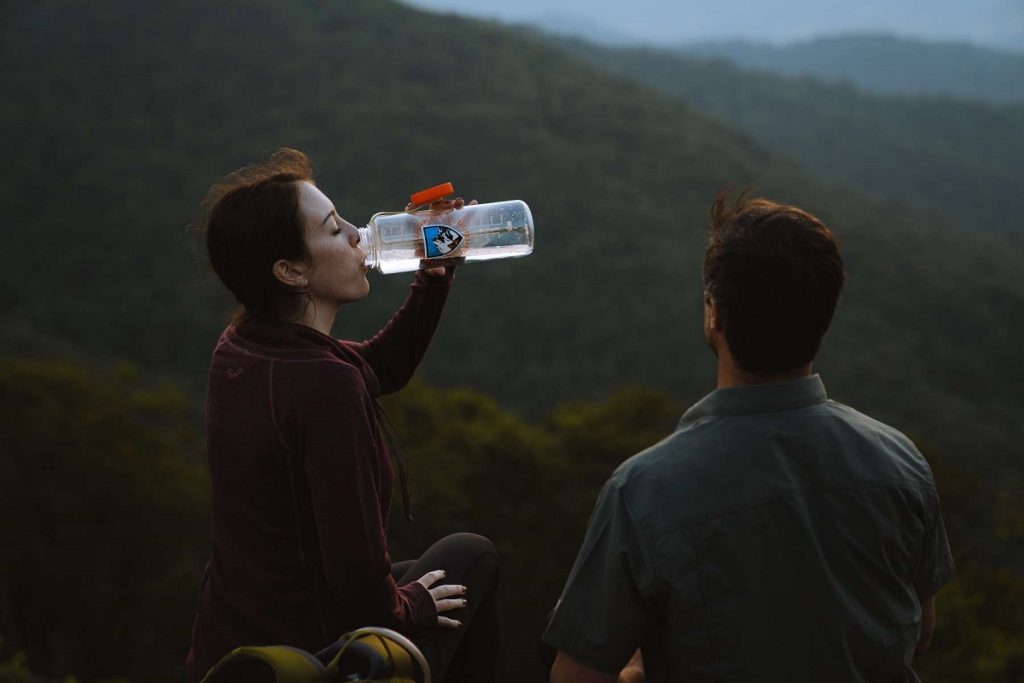
KÜHL’s Tips on How to Handle and Store Food When Camping
- Plan Your Meals: Mapping out each meal helps to avoid overpacking and reduces food waste. Consider the number of days, meals per day, and the size of your group.
- Use Airtight Containers: They're key to keeping food fresh and avoiding messy spills. Plus, they help organize your food efficiently. The best camping food storage containers will be plastic, so try to avoid glass as these will break easily.
- Keep Perishables Cool: A good cooler with ice or ice packs is essential, especially for meats, dairy, and certain vegetables.
- Be Wildlife Aware: In areas with active wildlife, especially bears, use bear bags for camping or canisters for storage. It's about protecting your food and the animals.
- Maintain Cleanliness: Proper sanitation, like washing dishes and disposing of trash, helps prevent attracting animals. A clean campsite is a safe and pleasant one.
- Smart Packing: Organize your cooler by meal and day. Consider freezing some items to act as additional ice packs. Opt for collapsible bowls, cups, and even a sink for space-saving storage.
- Stay Hydrated: Bring enough water for cooking and drinking. In remote areas, consider water purification methods.
- Emergency Snacks: Have some non-perishable snacks handy for unexpected delays or emergencies.
- DIY Spice Kit: Create a mini spice kit using small, airtight containers or repurposed tic-tac boxes. This saves space and keeps your seasonings handy.
- Camping Food Organizer: Use and tie up a shoe organizer over your camp table or tent side to store utensils, snacks, and small items, keeping them accessible but off the ground.
Final Thoughts
Getting your camping food storage right is more than just a handy skill – it's a big part of staying safe and looking after the environment when you're out in the wild. Stick to these guidelines and you’ll keep your meals fresh and safe, which really ups the fun and eco-friendliness of your trip. It's all about making smart choices with your food, from where you store it to how you pack it, to make sure you're doing your bit for nature while having a great time.
FAQs
Should I keep food in my tent?
You should not store food in your tent. Doing so can attract wildlife, which is a risk to both you and the animals. Instead, use designated food storage areas for camping or bear-proof containers, or hang your food away from your sleeping area.
How long does camping food last?
The lifespan of camping food depends on what you're bringing and how you store it. Perishables like meats and dairy should be kept cool and will last a few days in a good cooler. Non-perishables like trail mix can last much longer. Proper storage is key to preventing spoilage.
What's the best food to take camping?
Ideal camping foods are non-perishable, nutritious, and easy to prepare. Think nuts, seeds, dried fruits, and whole-grain crackers for snacks. Dehydrated meals are also great for longer trips, as they're lightweight and only require water. If you’re looking for something more hearty, then these are the best camping recipes to try out.
How do you protect eggs while camping?
Store eggs in a hard container to keep them safe while camping – this prevents breakage. Keep them in a cooler to maintain freshness, especially in warm weather. Bringing pre-scrambled or hard-boiled eggs can save prep time and reduce the risk of breakage.
How long does dehydrated food last if vacuum sealed?
Vacuum-sealed dehydrated food can last a long time, often several months to years, depending on the food type. It's an excellent choice for extended trips because it's lightweight, compact, and only needs water to rehydrate. Always check expiration dates and storage instructions for the best experience.

